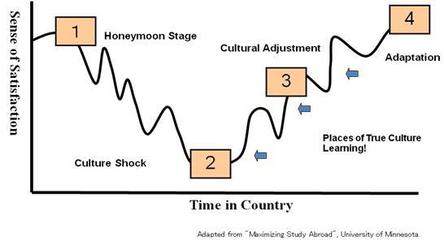Away from home? You can be prepared for culture shock
By Nora Sabahat Takieddine, January 20, 2014
Traveling and living abroad is a pretty common phenomenon these days. Whether it is leaving home to go to college, or moving because of a better job opportunity, or feeling a crisis area and finding a safer place to live – whatever the reason – you are joining the greater community out there that is away from home. But just because it’s common, it doesn’t mean it’s all smooth sailing.
The term culture shock was first introduced by anthropologist Kalervo Oberg in 1960. He noticed that people who travel abroad seem to express similar psychological symptoms. He also noticed that experiences can, in one way or another, be clustered into stages of progression through culture shock to acculturation. Since then, different terminologies have developed, with new stages added and many nuances. But, for the purpose of this article, let’s keep things simple and focus on the basics.
At one point or another of having moved to a new city, you will probably find yourself in one of the following four stages: The Honeymoon Stage, The Distress Stage, The Cultural Adjustment Stage, and the Adaptation Stage.
The Honeymoon Stage: This first stage usually includes the mix of emotions that tend to come up whenever we are doing something new. There is both anxiety and excitement. There is a lot to learn and there can be a sense of anticipation as well as possibility and openness. The nervousness or tightness in the tummy are matched with enthusiasm to discover the new world.

The Distress Stage: Some time after making a move, the exciting buzz of the novelty dies down. The differences in communication (both verbal and nonverbal) and the etiquette of interaction are no longer fascinating. Instead, they can start to be a source of frustration. No longer a master of the ins and outs of your terrain, in this new place, you are a novice once again. While back home there was a community around you, supporting you and encouraging you with the challenges you faced, here you are facing most of them alone. It is common, at this stage, to get really homesick. You miss your family and friends, the people “who get you”, and long for the familiar tastes, sounds, and smells.
The Cultural Adjustment Stage: Now, there is more clarity about how things are done in the new context you are in. A mental map starts to form, and adjustment can be made to begin to fit in. Interestingly, at this point, although there may be some sense of satisfaction at the success of adjusting, happiness is not a strong marker of this stage. Rather, there can be feelings of anger, resentment and judgment. Let’s take a moment and normalize this. The concept of adjusting implies having to change something from the way it is usually done. Identity crisis may surface as there may be a sense of having to choose between different value systems. And when you are out of your support system, it is natural for anger to accompany the need to adjust. Therefore, this stage tends to include not only criticizing the way things are in the new place, but also romanticizing the way things were back home.
The Adaptation Stage: The adaptation stage marks the beginning of integration. You now know your way around and, in some ways, you have become one of the locals. At this stage, the level of stress, anxiety, sadness, and anger that accompanied culture shock and adjustment have subsided. In their place, there can be a greater sense of happiness, joy, and peace that comes with knowing your new terrain, having a community, and feeling settled.
What to make of the stages?”
Let’s think of the stages as a map or an outline of what to expect. The stages aren’t fixed and necessarily linear. It isn’t like moving through the levels of a video game. Rather, the experiences are more fluid and you can have different feelings at different times. Think of the stages as a way of helping you make sense of where you are and gain perspective on the psychological challenges of relocating.
Oftentimes, people feel confused by the dip in feelings they experience several months after moving. I’ve heard people say: “I don’t understand. I was happy and excited. This is all great. I even started to make friends and I love my job. But I’m just feeling so overwhelmed and exhausted. What happened? Was I kidding myself? Maybe I made a mistake. Everyone else seems to be doing fine. Maybe I’m just not strong enough. ”
If we think about the stages, we know that, no, you weren’t kidding yourself. Nothing “happened”. It is all part of the culture shock process. The excitement of the novelty has died down, and you are struggling with the distress and adjustments described in stages 2 and 3.

So what can you do?
The funny thing – being someone who has been through culture shock myself – I’ve actually been told that there’s nothing you can do but bear the process. I’m here to say that’s not true. Yes, you have to go through the stages of culture shock, just like having to go through the growing pains of adolescence. But there are things that you can do to make the process easier.
- Recognize culture shock: Awareness is the first step to being able to attend to anything and to being kind towards yourself. By being aware that culture shock is a common part of moving away from home, you can prepare yourself to get support when you need it.
- “Check-up” with a monthly “check-in”: We do check-ups with doctors to make sure our health is fine. We can do the same for ourselves for our psychological health. Doing a monthly self-check-in invites you to take a moment and gage where you’re at and how you are doing. This can give you clarity. It is an opportunity to recognize when you are struggling with symptoms of culture shock and to consciously dig into your coping tool kit to support you through the process.
- Respect your process: It’s very easy to judge our feelings and criticize our perceived ability to acculturate. But remember, the natural process of culture shock includes many ambivalent and negative feelings. Allow yourself a safe space to have your feelings and give yourself what you need.
- Join an expat community: One of the elements that aggravate culture shock is the absence of a community. Join a community of internationals and expats – they probably know what you’re going through and can help normalize it, lighten the experience, give you a place to express it, share some tips on what worked for them, and also have a good time together.
- Don’t short-change yourself, treat yourself to professional support: Going through culture shock can still be a difficult process and it is important to realize that there is professional help available. An experienced therapist can facilitate your navigation through the multi-layered and paradoxical processes of going through culture shock.
